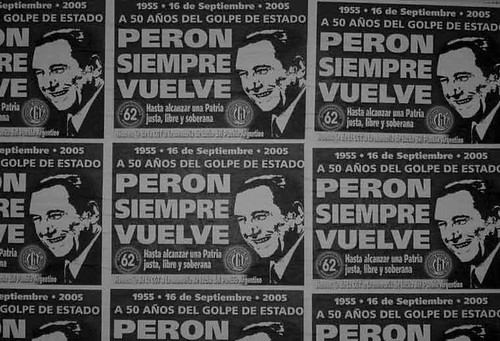September 19, 2005 is the 50th anniversary of the coup that ousted Juan Perón from power. Evidently, from these posters, some people just haven’t gotten over that.
Perón had been president from 1946 – 1955 and was the dominant figure in the government for several years before becoming president. Afterwards, he lived in exile and briefly returned as president in the early 1970s before dying in 1974.
Argentine political history is complicated and the popularity of Perón is one of the more difficult topics to understand. The nature of modern Peronism, especially the current split in the Peronist party, adds to the confusion….but that’s another post entirely.
Perón’s power had been weaking for several years before his downfall in 1955. Much of Perón popularity was in the form of his wife, Eva, who died of cancer in 1952. The country also was in an economic crisis in 1952. The economy had essentially stopped growing due to various miscalculations by the government over a number of years. The urban working population expanded but the manufacturing sector didn’t have enough jobs to accomodate the expanded workforce. Social protests resulted in a large number of strikes in 1954.
(The posters in the photo were put up by the CGT [Confederacíon General del Trabajo] the major labor union, which always was a significant supporter of Perón. (Of course, the history and present status of Argentine labor unions and the working class is yet another extremely complicated topic).
As conditions worsened in the early 1950s Perón became more authoritarian. His clash with the Roman Catholic Church resulted in the Church becoming a symbol of opposition to his government. Also the military became more restless with Perón as high-ranking officers started to glimpse opportunities to grab their own share of the power; Perón himself had achieved political success through his own military career
One of the most tragic episodes in Argentine history was June 16, 1955. Perón supporters were rallying in Plaza de Mayo when navy planes started to drop bombs in an attempted coup. It is really a shocking event that the military could bomb its own people. (Yet, more attrocities from the Argentine military would be coming in future decades). The coup failed but Perón basically had lost power and was hanging on thanks only to the support of the army, which hadn’t yet totally turned against him. For a few months in the middle of 1955 Argentina was on the verge of civil war. The army finally turned against Perón on September 16 with rebellions in Córdoba and Bahia Blanca. Perón resignation came on September 19, 1955.

September 20th, 2005 at 3:05 am
VIVA PERÓN
September 20th, 2005 at 1:49 pm
Marc, Why viva Perón?
March 10th, 2006 at 3:21 pm
Peron was the best President that Argentina will ever know. It’s a shame that the young youth has no idea about any of his efforts and good intentions that he made possible for his country. If you ask any of the Elder people in Argentina about Peron. They’re answer will be the same as mine. He was the Best!